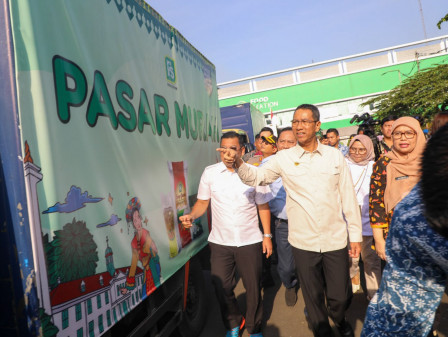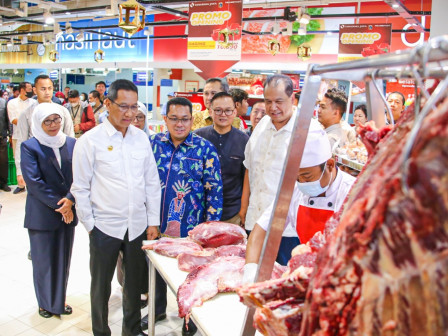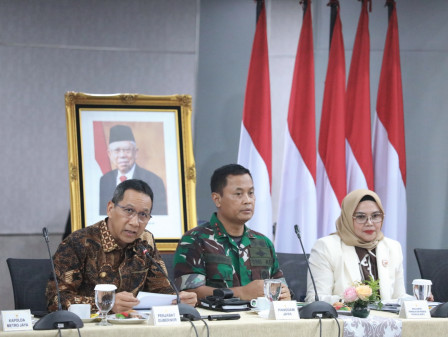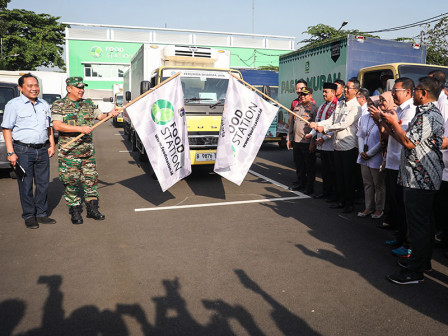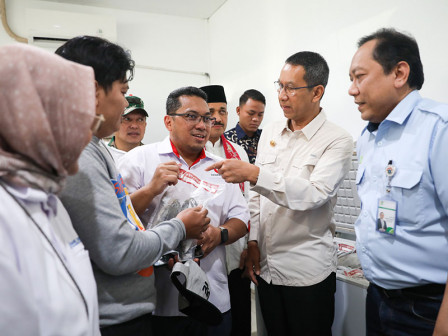Heru Acts Quickly to Drive Jakarta's Economic Growth
Reported by Aldi Geri Lumban Tobing | Translated by Nugroho Adibrata
Maintaining economic stability after the Covid-19 pandemic is the commitment of Jakarta Acting Governor, Heru Budi Hartono when leading Jakarta. Various steps have been taken to maintain food security, control inflation, and overcome poverty.
We also keep working together with the central government
In carrying out this commitment, the Acting Governor synergizes with the central government and encourages cross-regional collaboration within the Jakarta Provincial Government. Leading the Food Task Force in maintaining price stability, he is directly involved in investigating conditions in various markets to check prices, availability, as well as production and distribution of food needs. It was carried out with President Joko 'Jokowi' Widodo; Trade Minister, Zulkifli Hasan; Agriculture Minister, Syahrul Yasin Limpo; and National Food Agency Head, Arief Prasetyo Adi.
"Jakarta Government together with the central government continue to ensure that the implementation of the Supply Availability and Price Stabilization (KPSH) program runs smoothly and is increasingly massive. In this holy month of Ramadan and Idul Fitri, we also keep working together with the central government for the availability of guaranteed food with good quality, including stable and affordable prices for Jakartans," he expressed, as quoted by Jakarta PPID's press release, Wednesday (3/29).
Commission B: City Must Maintain Stock and Stability of Food Needs During Ramadan and Idul FitriThis synergy is also realized by the smooth supply and distribution of food supplies through inter-regional cooperation on a Business to Business (B2B) basis for the commodities of rice, beef, chicken meat, chicken eggs, chilies, and red onions in 36 regencies/cities in 9 provinces. Among them are chilies and red onions supplied from Central Java (Magelang and Temanggung) and West Java (Garut and Sumedang). This cooperation in the food sector cannot be separated from the role of Jayakarta Military Command and Metro Jaya Police who also monitor local food prices and the distribution of supplies, thus it runs well.
Price stability and smooth supply distribution have contributed to controlling inflation in Jakarta. In February 2023, Jakarta's inflation was the lowest compared to other provinces in Indonesia, at 4.07% (year on year).
"Jakarta Government would like to thank the central government for its support in controlling inflation in the food sector in Jakarta. Besides influencing Jakarta's inflation, it also influences national inflation, as Jakarta's inflation rate affects 25-27% of national inflation," he expressed.
He also ensured that food subsidies for people in need would continue. In this program, people can take food packages worth Rp 126,000, consisting of the commodities of rice, beef, chicken meat, chicken eggs, mackerel, and milk at 366 distribution locations.
The beneficiaries of this subsidized food program are holders of the Jakarta Smart Card (KJP), Jakarta Worker Card (KPJ), Jakarta Elderly Card (KLJ), Jakarta Persons with Disabilities Card (KPDJ), Jakarta Children Card (KAJ), Individual Other Service Provider officers ( PJLP), honorary teachers and non-PNS education staff, residents of flats, as well as Family Welfare Empowerment (PKK) cadres.
In anticipating a decline in people's purchasing power, efforts have been made to improve the economy by expanding employment opportunities and entrepreneurship. The Jakarta Industry Trade Cooperatives and Small and Medium Enterprises (PPKUKM) Agency has received 18,183 new participants who registered for Jakarta Entrepreneurs, held Jakarta Entrepreneur training for 5,017 participants, 3,792 permits have been granted to Jakarta Entrepreneur participants, and marketed 376 products fostered by Jakarta Entrepreneurs to various national and international exhibitions.
Through Jakarta Manpower, Transmigration and Energy Agency, as many as 55 training classes (regular and mobile training units) have been conducted, job skills training at 7 Job Training Centers and the Seribu Islands Manpower, Transmigration, and Energy Sub-agency, as well as job fairs in 5 regions city. As a result, 77.03% (5,871 of 7,626 people) of training participants were accepted into the job market.
Efforts to encourage more new entrepreneurs in Jakarta are also accompanied by the Increasing Use of Domestic Products (P3DN). The Jakarta Government also won an award from President Joko Widodo on March 15, 2023, for the category of the Best Domestic Product User for the Provincial Government. Various efforts have been made by the P3DN Team to encourage the use of domestic products, including actively participating in National Business Matching Phase I to Phase IV, encouraging OPD to spend Domestic Component Level (TDKN) certified products through e-catalogs and e-orders, etc.
"Based on the BPKP P3DN Supervision System, the realization of the use of domestic products in Jakarta in 2022 is Rp 20.454 trillion (180.47% of the Indonesian Proud Affirmation Action Commitment). We will increase it in the following years," he explained.
The various efforts above are also the implementation of the commitment to reduce extreme poverty in Jakarta with a target of 0 percent in 2024. The Acting Governor has instructed the ranks of the Jakarta Government to keep implementing the Integrated Poverty Intervention Program. The first intervention is to directly check each region to validate and update data, involving cross-sectoral regional apparatus, including PKK cadres, Dasa Wisma cadres, and other communities.
Second, poverty alleviation through reducing the expenditure burden for poor families, while continuing to provide subsidized assistance in the Social-Health, Food, Clean Water, Septic Tanks, Flats, and Transportation sectors.
Third, tackling poverty through programs to increase productivity and income, such as job skills training, job fairs and job fairs, and integrated entrepreneurship (Jakarta Entrepreneur).
Fourth, poverty control through regional-based poverty reduction programs, including improving the quality of settlements in around 220 RWs, family planning programs for couples of childbearing age, and provision of additional food for the elderly and toddlers. The hope is that people's welfare can increase and further strengthen purchasing power for economic stability.
"To achieve the target of 0 percent is not easy, because there are various challenges, including the mobility of migrants to Jakarta and the ease of moving residents from outside Jakarta ID card to Jakarta. However, the Jakarta Government will continue to ensure that the recipients of the Integrated Poverty Intervention Program remain on target," he uttered.

